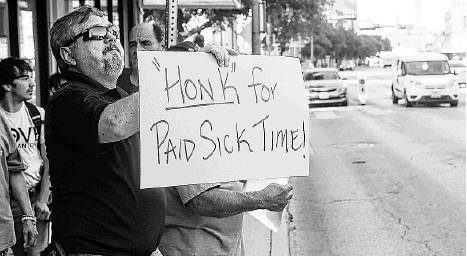LGBTQ Texans warn against bill
Critics allege it guts job protections; senator says it halts onerous rules
By Allie Morris AUSTIN BUREAU
AUSTIN — City ordinances that protect gay, lesbian and transgender Texans from employment discrimination would be undermined by a newly amended state Senate bill, civil rights advocates say.
The prospect of weakening those anti-discrimination rules could set up the latest culture clash in the Texas Legislature, two years after the controversial “bathroom bill” stoked deep divisions among top Republican leaders.
At issue is a sweeping bill — backed by Republican Gov. Greg Abbott — that would bar cities from regulating employment policies and likely undo San Antonio’s ordinance that requires private businesses to provide paid sick leave to employees.
Texas lawmakers have largely stayed away from contentious social issues this session as they pursue costly measures to slow the escalation of property taxes and put billions more dollars into public education. It’s a stark contrast from the last legislative session, when debate over the bathroom bill that would have restricted the public bathrooms trans-gender people can use took up most of the political oxygen.
It’s unclear whether the employment bill will meet the same resistance.
City anti-discrimination ordinances were initially exempt from the legislation nullifying local employment laws, but a recent rewrite of the Senate bill stripped that section. The changes also narrowed the bill — known as SB15 — to focus only on sick leave, scheduling and benefit policies.
At a recent committee hearing, the bill’s author, Sen. Brandon Creighton, R-Conroe, said the nondiscrimination section is no longer needed because the revised bill doesn’t affect local rules regarding hiring practices.
A spokeswoman for Creighton said neither version would prevent cities from enacting nondiscrimination policies.
“Any argument that says so is inaccurate,” spokeswoman Erin Wilson said in a statement. “Senate Bill 15 is strictly a response to local governments imposing burdensome, costly regulations on Texas private businesses.”
Advocates for LGBTQ Texans, however, argue the change could gut the ability of cities to enforce anti-discrimination ordinances for employee benefits, leave and scheduling.
Possible scenarios they cite include a business that denies parental leave to an employee who is LGBTQ, or refuses to give time off for a honeymoon or other family event.
Texas law doesn’t prohibit discrimination based on gender identity or sexual orientation, but a handful of cities, including Dallas, Austin and San Antonio, have adopted their own policies.
“Millions of people are covered by nondiscrimination protections at the local level (and) stand to have those protections dramatically cut back,” said Cathryn Oakley, the state legislative director and senior counsel at the Human Rights Campaign.
The bill could come up for a vote in the full Senate as early as next week.
It’s not clear whether Abbott or Rep. Craig Goldman — a Fort Worth Republican who filed similar legislation in the House — approve of the change.
Neither returned a request for comment.
When touting the legislation at business events, Abbott has focused on the paid sick leave aspect, saying such policies should be discretionary and not mandated by local government.
David Welch, a Houston resident and leader of the Texas Pastor Council, says the bill would create a uniform standard for businesses across the state.
“SB 15 is one step in reversing the continued march toward unequal rights with a hodgepodge of laws throughout hundreds of cities and counties having different laws, language and enforcement,” Welch said in a statement.
The council — which was a backer of the so-called bathroom bill last session — sued the city of Austin over its anti-discrimination ordinance in 2018.
Jessica Shortall, with the business coalition Texas Competes, said the group is trying to understand the revised bill’s potential effect on cities’ anti-discrimination ordinances. Early analysis of the changes, Shortall said, suggest the “best case scenario is confusion, and worst case is opening a door” to eroding the local ordinances. amorris@express-news.net
